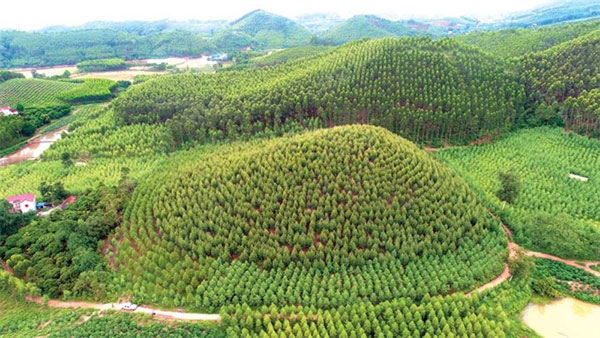[ad_1]
VietNamNet Bridge – A move by the northern province of Bac Giang’s administration to lease 1877ha of forest land to a State-owned forestry company with a track record of violations and mismanagement has evoked strong protests from local residents.
 |
|
A forest in Yen The District in the northern province of Bac Giang. The province has discovered a number of violations related to forest protection and management. — Photo baobacgiang.com.vn
|
The protestors said they were native caretakers who had been managing parts of it for decades and their livelihoods were threatened by this move.
More than 600 households from 10 communes and townships of Yen The District in Bac Giang Province protested against a decision issued in January 2015 by Vice Chairman of the provincial People’s Committee, Lai Thanh Son, to lease the land to Yen The Forestry One-member Ltd Company.
“We are native residents. Our livelihood is the forest. We are the ones who have been carrying out the State and Party’s policy on ’Greening the Barren Hills.’
“Now, if the province’s People’s Committee takes away our forestland and gives it to the Yen The Company, what will we live on?” asked Bui Thi Hoe, a resident of Tam Hiep Commune.
While the area leased to the company and those managed by the locals seems to be clearly delineated on a map, it is harder to distinguish this on the ground.
Vu Thanh Hien, head of Centre of Research and Development in Upland Areas (CERDA), a Vietnamese NGO, said dispute was “unavoidable” in this case since many local residents say their families has been living off these lands for four generations. It is natural that they feel their legitimate rights are being stripped off, he said.
A Vietnam News Agency report has noted that the overlapping of forestland leased out to State forest enterprises (SFEs) and those managed by natives are not a rare occurrence across the country.
Responding to local people’s concerns, Chairman of Bac Giang Province’s People’s Committee Nguyen Van Linh had in late July this year, signed a decision to form a working group – headed by Ngo Van Xuyen, deputy director of the provincial environmental department – to “thoroughly investigate the management and use of forestry land in the Yen The District.”
Series of wrongdoings
Two months later, the working group delivered its report to the chairman of the provincial People’s Committee, pointing out a series of wrongdoings committed by the Yen The District People’s Committee and the Yen The Forestry One-member Ltd Company.
According to the report, the company handed 246.8ha of forestry land then under its management and use to local-level governments. However, large portions of this 246.8ha are plantations that have not been harvested, making it difficult for commune administrations to proceed with their plans.
In previous years, the handing over of forestland completely failed to refer to cadastral records, the report said, adding that the work was done purely “on paper,” without any field trips to verify the information. This has led to the current ambiguity over forest land allocated to the company and the land that natives have been managing.
The report also said that because due process was not followed, some communes that were supposed to receive forest land were unable to determine how much land they’ve got.
The working group also pointed out the Yen The Company has demonstrated “negligence” in its forest management tasks for a long time.
It has been seen that after the company exploits the resources of a natural forest, including its trees, it has failed to designate it as an off limits area to allow re-growth. This, in turn, has allowed locals to further destroy tracts of natural forest to grow crops.
The report also criticised Yen The District authorities for negligence in forest management, especially its failure to maintain accurate maps and update cadastral records.
The group recommended that the disputes with local resident be settled clearly in line with existing regulations.
Residents’ rights ignored
Many protestors have noted that in all of the State’s afforestation programmes, like the “Greening the Barren Hills” Programme 327, the World Food Organisation-supported PAM afforestation programme, or the 5-million-hectare reforestation Programme 661, the guiding principle has been to make locals the main protectors of the forest, and that in this process, they use the natural resources sustainably.
In addition, forest use permits were to be issued to households to ensure stability and evoke a natural desire to protect the source of their livelihood, the forest.
But the perception that this guiding principle has been ignored to favour companies is further strengthened by another recent decision by Bac Giang Province to lease 1,400ha of forestland to the Truong Loc Company for a mind-boggling VND43.2 (less than US$0.002) per sq.m per year, not to mention a land lease waiver for 15 years, the Tai nguyen & Moi truong (Natural Resources and Environment) newspaper reported.
In light of this information, the public have raised concerns about major wrongdoings in the implementation of the forestland allocation policies and policies that trample the rights of residents of remote and disadvantaged areas who directly live off the forests.
VNS
| related news |
[ad_2]
Source link
